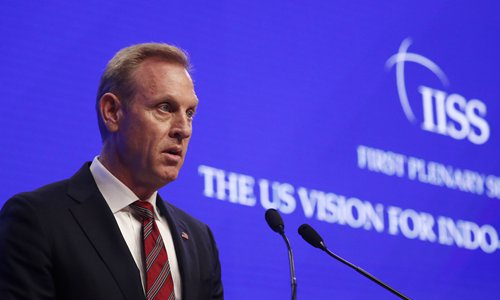HOME >> OPINION
US Indo-Pacific strategy has frail foundation
Source:Global Times Published: 2019/6/11 21:13:40

Photo: IC
When the US Department of Defense released its Indo-Pacific Strategy Report (IPSR) on June 1, focused on containing China, it intended to highlight two points: Washington is determined to safeguard peace in the region and it has the capability and means to do this.Washington seldom issues a formal report on the Asia-Pacific region. This latest one is another report following the 2015 Pentagon release, the Asia-Pacific Maritime Security Strategy. The move indicates how the US is underscoring the importance it attaches to the Pacific and Indian Oceans.
However, Washington has faced multiple challenges to carrying out its ramped-up strategy.
It has become harder for the US to manage its global alliance. As a superpower, its most valuable resources are its allies. After Donald Trump took office, Washington has withdrawn from major organizations and agreements, while making impertinent remarks about its allies.
The US was once willing to provide a security umbrella for its allies, but this is no longer the case. Trump has raised the issue many times that allies should pay more for stationed US troops within their territory, and NATO members should bear more expenses.
It is a sign the US is turning from a superpower into an ordinary power, and its allies are concerned. They doubt whether Washington is still capable of keeping its superpower status and if it is willing to sustain its leadership role in their regions.
The first challenge for the Pentagon's Indo-Pacific strategy is its allies' questioning over US intention and capability. If the US retreats from its previous leadership position, countries like Australia and Japan will join forces out of their own interests and security.
US investment in the region has not met expectations of regional countries. Expanding military bases, increasing military presence, and joint military drills are long-term traditional measures to maintaining stability in the Asia-Pacific region.
However, the China-proposed Belt and Road Initiative (BRI) is an economic plan, which meets the demands of other nations in the region. If the US attempts to thwart the BRI through military presence, its efforts will end in vain since such actions have been wrong from the beginning.
Smaller countries in the Asia-Pacific region yearn for infrastructure development. They need development assistance, so they invited China, which was willing to help. Washington does not want to see such close collaboration between regional countries and Beijing, yet the US can hardly provide a feasible alternative to the BRI.
In November, US Vice President Mike Pence announced the new "Indo-Pacific Transparency Initiative," adding "in conjunction with more than $400 million in American funding, this program will help empower the region's citizens" while attending the APEC CEO Summit.
However, the US is without any arrows in its quiver. As a result of its political system, it would take too much time before funding could find approval.
How to tread a fine line while implementing strategies is another test for the US. If it is not domineering, it could hardly keep the Asia-Pacific under control. However, if it is too assertive, it could cause hostility.
The Korean Peninsula nuclear issue is an example. When adding pressure on North Korea, Washington elicited fierce and uncompromising responses. It is the same with the Taiwan question. When the US steps up its military support to the Taiwan Island, the Chinese mainland will only have to boost its military capabilities as Taiwan is Chinese territory, and the US is interfering with its domestic affairs.
The US likes to talk big, yet does very little. On June 1, Acting Defense Secretary Patrick Shanahan stressed US commitment to the Indo-Pacific region and emphasized vital messages from the IPSR during the 18th Shangri-La Dialogue in Singapore.
I attended the Shangri-La Dialogue for the first time in 2012 and heard then-US secretary of defense Leon Panetta made similar remarks. So did Panetta's successors. It is like a head of a company, who wants to retain its employees without paying them what they are worth. So, the head continues to make empty promises. Yet, rest assured that doubts will surface within due time.
China is undertaking giant initiatives, such as the BRI. This is the most significant difference between Beijing and Washington.
Admittedly, problems have emerged during the process, but China is not avoiding hurdles. Compared with the US, which often fails to honor its commitments, China is making genuine efforts to help other nations.
The article was compiled by Global Times reporter Li Aixin based on an interview with Zhao Xiaozhuo, a senior fellow of the Institute of War Studies, Academy of Military Science. liaixin@globaltimes.com.cn
Posted in: ASIAN REVIEW